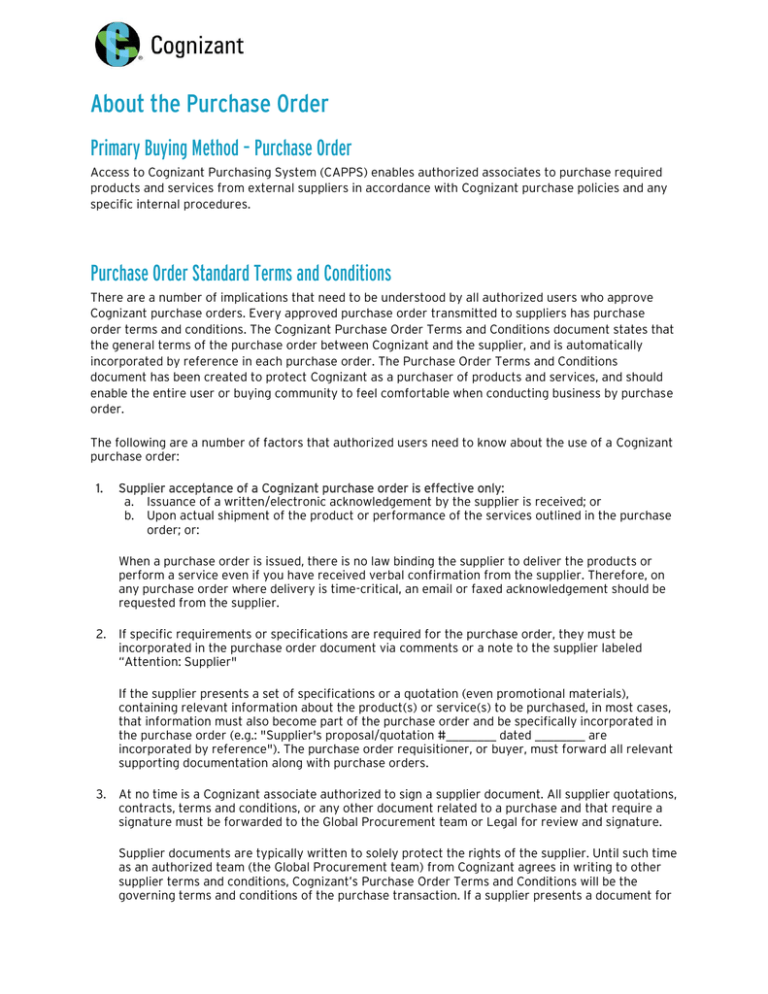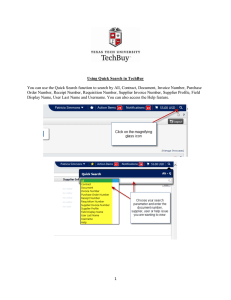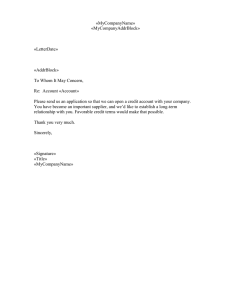
About the Purchase Order
Primary Buying Method – Purchase Order
Access to Cognizant Purchasing System (CAPPS) enables authorized associates to purchase required
products and services from external suppliers in accordance with Cognizant purchase policies and any
specific internal procedures.
Purchase Order Standard Terms and Conditions
There are a number of implications that need to be understood by all authorized users who approve
Cognizant purchase orders. Every approved purchase order transmitted to suppliers has purchase
order terms and conditions. The Cognizant Purchase Order Terms and Conditions document states that
the general terms of the purchase order between Cognizant and the supplier, and is automatically
incorporated by reference in each purchase order. The Purchase Order Terms and Conditions
document has been created to protect Cognizant as a purchaser of products and services, and should
enable the entire user or buying community to feel comfortable when conducting business by purchase
order.
The following are a number of factors that authorized users need to know about the use of a Cognizant
purchase order:
1.
Supplier acceptance of a Cognizant purchase order is effective only:
a. Issuance of a written/electronic acknowledgement by the supplier is received; or
b. Upon actual shipment of the product or performance of the services outlined in the purchase
order; or:
When a purchase order is issued, there is no law binding the supplier to deliver the products or
perform a service even if you have received verbal confirmation from the supplier. Therefore, on
any purchase order where delivery is time-critical, an email or faxed acknowledgement should be
requested from the supplier.
2.
If specific requirements or specifications are required for the purchase order, they must be
incorporated in the purchase order document via comments or a note to the supplier labeled
“Attention: Supplier"
If the supplier presents a set of specifications or a quotation (even promotional materials),
containing relevant information about the product(s) or service(s) to be purchased, in most cases,
that information must also become part of the purchase order and be specifically incorporated in
the purchase order (e.g.: "Supplier's proposal/quotation #________ dated ________ are
incorporated by reference"). The purchase order requisitioner, or buyer, must forward all relevant
supporting documentation along with purchase orders.
3.
At no time is a Cognizant associate authorized to sign a supplier document. All supplier quotations,
contracts, terms and conditions, or any other document related to a purchase and that require a
signature must be forwarded to the Global Procurement team or Legal for review and signature.
Supplier documents are typically written to solely protect the rights of the supplier. Until such time
as an authorized team (the Global Procurement team) from Cognizant agrees in writing to other
supplier terms and conditions, Cognizant’s Purchase Order Terms and Conditions will be the
governing terms and conditions of the purchase transaction. If a supplier presents a document for
signature, do not sign the document: forward it to Purchasing Services for review, and if
appropriate, final execution.
4. Cognizant’s Purchase Order Terms and Condition document specifies that the risk of loss during
the transit remains with the supplier. If you receive damaged products, immediately contact the
supplier in accordance with Cognizant’s Receiving and Inspecting Purchased Goods procedure. Do
not put damaged products into use. Once damaged products are put into use, it becomes
extremely difficult to get a satisfactory resolution with the supplier. If the shipping container
shows visible external damage, do not accept the delivery and immediately contact the supplier.
5. Cancellation of an approved Cognizant purchase order must be timely and in accordance with the
Purchase Order Cancellation Procedure.
Cognizant User’s Roles & Responsibilities
Receiving and Inspection of Purchased Products requires due diligence on the part of
Cognizant recipients to ensure the proper receipt of purchased products.
In order to ensure proper receipt of goods, Cognizant employees are to adhere to the receipt
of goods guidelines listed below.
Duty to Inspect Products
The requisitioner receiving and signing for the products has the duty to inspect products upon
receipt. (The recommendation is to perform this action while the delivery person is still
present because this is the most reasonable time to determine whether the correct number of
conforming goods arrived without damage and they match to the Purchase Order)
The party receiving the shipment should follow these steps:
1.
Inspect the delivery for two things:
• Damage
• Conforming products matching to the information mentioned on the ordering document.
2. Check the products against the packing slip to confirm that the description of the products and the
number of items shipped match.
3. Compare the delivered products, the packing slip and the purchase order if available.
4. Check for shortages or overages.
5. If shortages or overages occur, the requisitioner should note discrepancies on the delivery receipt
before accepting and signing for the products.
6. Be sure to retain a copy of the paperwork for your records.
7. Initiate a claim for any damage or non-conforming goods identified in the inspection.
World Headquarters
European Headquarters
India Operations Headquarters
500 Frank W. Burr Blvd.
Teaneck, NJ 07666 USA
Phone: +1 201 801 0233
Fax: +1 201 801 0243
Toll Free: +1 888 937 3277
1 Kingdom Street
Paddington Central
London W2 6BD
Phone: +44 (0) 20 7297 7600
Fax: +44 (0) 20 7121 0102
#5/535, Old Mahabalipuram Road
Okkiyam Pettai, Thoraipakkam
Chennai, 600 096 India
Phone: +91 (0) 44 4209 6000
Fax: +91 (0) 44 4209 6060
© Copyright 2014, Cognizant. All rights reserved. No part of this document may be reproduced, stored in a retrieval system, transmitted in any form or by any means, electronic,
mechanical, photocopying, recording, or otherwise, without the express written permission from Cognizant. The information contained herein is subject to change without notice. All other
trademarks mentioned herein are the property of their respective owners.
Purchase Order Invoice Payment
Cognizant’s Accounts Payable department is responsible for the timely processing of supplier invoices
issued against approved purchase orders. Upon shipment of products, or services performed as
requested on the official purchase order, the supplier is required to submit all corresponding invoices in
a timely manner directly to Accounts Payable (within 7 business days from shipment or service
completion) as instructed on the purchase order. In order to be processed by Accounts Payable, the
supplier invoice must reference the same supplier information contained on the purchase order, a
unique invoice number, the invoice date, and the appropriate Cognizant purchase order number.
The following is information that Cognizant users may find helpful regarding the payment of purchase
order invoices.
1.
2.
All supplier purchase order invoices must be submitted directly to Accounts Payable. Cognizant
employees or users or buyers are not permitted to direct a supplier to submit original purchase
order invoices to the ordering department.
A payment is made for purchase order suppliers within the pay terms (agreed pay terms) from the
date of the supplier invoice receive date, provided the invoice was received by Accounts Payable
and is not "on hold/Reject" in the Catalyst/payment system.
After-the-Fact Transactions
An "After-the-Fact" purchase transaction is a purchase that has been made by an associate or
employee or authorized buying agent without prior issuance of an approved purchase order or
agreement, and then, an attempt is made to initiate a purchase order after-the-fact in order to pay the
supplier invoice. Such a transaction violates Cognizant purchasing policy. Respective departments will
be advised of employees in their area who place orders for products and/or services without prior
approval of a Cognizant purchase order or agreement, and in turn, create financial liability and risk for
the institution.




